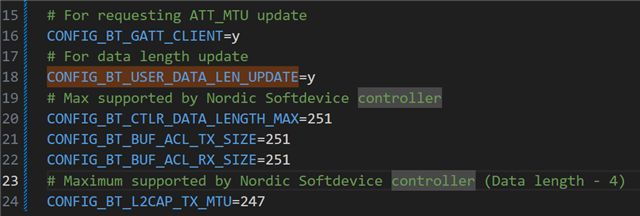Hello,
I have followed 2.2 from this blog post to try and get my application to update its data length and MTU size when connecting to the nRF Connect for Mobile app. It's not clear from the blog post when to call the 'request_...' functions, but I implemented it such that request_data_len_update is called at the end of my on_connected() callback and request_mtu_exchange is called if the data length update was successful. I made sure to set the same configurations.

However, when I do connect, I see in my debug log "bt_hci_core: bt_hci_cmd_send_sync: opcode 0x2022 status 0x12" and


